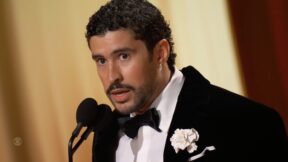Journalist Who Befriended Luigi Mangione Tells CNN He Was ‘Afraid’ of Tech Like Online Porn, Video Games Messing Up People’s Lives
Monday evening, CNN anchor Erin Burnett interviewed Gurwinder Bhogal, a British journalist who befriended Luigi Mangione, the 26-year-old man accused of fatally shooting UnitedHealthcare CEO Brian Thompson.
Thompson was shot and killed early in the morning on Dec. 4 outside of the New York Hilton Midtown, where UHC was holding an investor conference. Police have said they believe this was a premeditated and targeted attack. After Mangione was recognized at a McDonald’s in Altoona, Pennsylvania, he was taken into custody by local police, who found in his possession a ghost gun and suppressor and a manifesto that railed against the health insurance industry.
Mangione has been charged with murder, second-degree possession of a forged document, and both second and third-degree criminal possession of a firearm. So far, investigators have announced that fingerprints and shell casings found at the murder scene match the prints taken from Mangione and the gun he had on him when he was arrested.
Burnett spoke with Bhogal during Monday’s episode of OutFront, introducing him by noting that he had first interacted with Mangione starting in April of this year, around the time that Mangione had begun withdrawing from his family and friends.
Mangione was a fan of Bhogal’s blog, said Burnett, and the two exchanged messages and even had a nearly two-hour video conversation, until Mangione dropped the communication in June.
Bhogal told Burnett that his first impression was that Mangione “seemed like a really down to Earth guy,” describing him as “polite,” “thoughtful,” “open minded,” and “seemed very curious…always wanted to know more about things.”
Bhogal emphasized this curiosity aspect of Mangione’s personality, saying that if he made an “obscure reference to something,” Mangione would ask him to explain it, and would often try to get “practical takeaways” from this information he was seeking. “So he was always looking for practical takeaways to things and constantly looking for self-improvement, which is which is very interesting.”
Burnett asked about some of the reports about Mangione posting about the Unabomber, Ted Kaczynski.
According to Bhogal, Mangione “was afraid of losing agency” from the influence of technology. He explained:
He was afraid that technology was going to take people’s agency away. He actually believed that this was already happening. And so he became interested in Kaczynski’s work for this reason, because Kaczynski also believed this, and a lot of the conversation that we had was really about, you know, how technology is taking people’s agency away from them and how how we can sort of restore it, how we can reclaim our agency, how we can reclaim control over our lives. So that was something that resonated with, with him about Kaczynski’s work.
Bhogal added that Mangione had spoken about his time in Japan, criticizing people there for acting like “NPCs” — video game parlance for “non-player characters” that act predictably and don’t think for themselves.
During the two hour video conversation he had with Mangione, Bhogal said that “about 90%” of it “was about sort of the effects of technology on agency, and not just technology, but culture as well.”
Mangione “believed that it was the technological developments that were causing the cultural changes that were resulting in things like what he would call NPC behaviors,” that “shallow entertainment” was “taking people’s agency away from them.” Bhogal described how Mangione had “really resonated” with an article he had written about what he called “the intellectual obesity crisis, which is about useless information and and how we are addicted to useless information.”
The harms caused by “shallow entertainment,” Bhogal continued, were a top concern for Mangione:
And he was very concerned with things like online porn, like he believed that a lot of men were not going out and meeting women because they were addicted to porn. He was really concerned about video games. He believed that people were not making accomplishments. They were not accomplishing things in the real world because they were they were getting sort of these dopamine hits from video games.
And he also believed social media addiction was a big problem that was taking people’s agency away from them as well. And he feared this was happening to him as well. And one of the topics of the conversation, I mean, was about he wanted advice from me on how he could sort of reclaim some agency.
That was what led to the nearly two-hour video call, that occurred shortly before Mangione “sort of went off the grid or went missing in early July,” said Burnett. “Was there anything in that call that now you see what has happened stands out to you in retrospect?”
“I mean, there are a couple of things which kind of make a bit more sense now, but — I mean, I can’t say that I would have really predicted his behavior from that, from that video call,” Bhogal replied. “He did allude to his frustrations with the U.S. healthcare system,” specifically how expensive it was, and that led to a discussion about the UK system.
Mangione “kind of seemed to idolize the UK’s healthcare system,” Bhogal continued, “and I told him it wasn’t quite simple” because of challenges like “big waiting lists,” and “there’s a bit of a trade off.” The two did agree that the UK system was “better” than the U.S. one.
Bhogal commented that part of why Magione had reached out to him was because he felt that the journalist was “a kindred spirit” and he “couldn’t really talk” to “the people around him” because he felt like they “were on a different wavelength.” He also speculated that Mangione “may have been lonely.”
Watch the clip above via CNN.
New: The Mediaite One-Sheet "Newsletter of Newsletters"
Your daily summary and analysis of what the many, many media newsletters are saying and reporting. Subscribe now!






Comments
↓ Scroll down for comments ↓